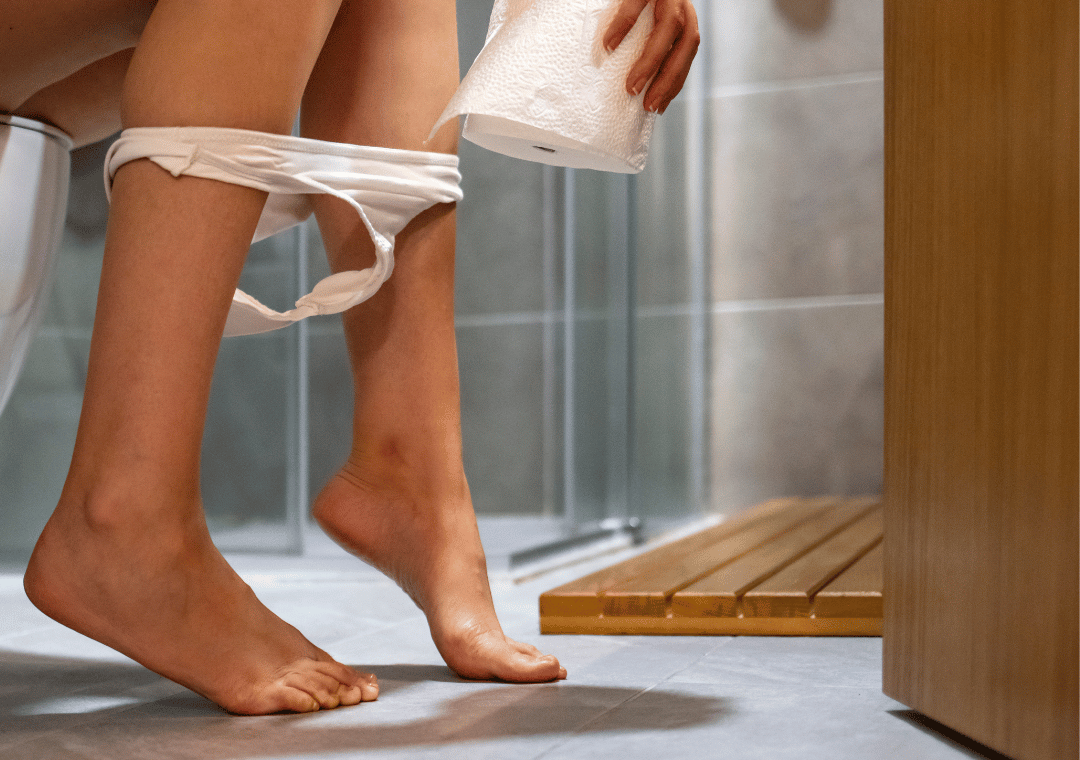Yep-there's a word for the excessive bowel movements you may experience during your period. Many women struggle with "period poops," diarrhea, constipation, gas, and bloating throughout their cycle. We turned to recent research and experts to understand what's actually happening in the body to cause these digestive issues. After all, when we know why we feel particularly bloated or gassy during our cycle, we're more likely to remain calm, remind ourselves that it's OK, and most importantly, understand what we can do to care for our health.
Remember: You're normal and not alone
First-don't worry. It's extremely common to have unusual bowel movements and other gastrointestinal (GI) side effects before, during and after menstruation. For example, a 2014 clinical study published in BMC Women's Health surveyed 156 women and inquired if they experienced any menstrual-related tummy troubles like abdominal pain, diarrhea, bloating, nausea, and vomiting. 73 percent experienced at least one of these symptoms.
So next time you bolt to the bathroom (or wish you needed to), keep in mind that it's normal and you're not alone.
What's the culprit?
Here's the thing: Researchers and doctors still don't know for sure what causes GI woes during our cycle. "Research is still inconclusive in determining the exact physiological connections between the GI and menstrual systems," explains a team of health and research specialists at the The University of Columbia. Unfortunately, there's still more research needed on this particular topic (and on women's reproductive health in general). However, in the meantime, there are a few scientific hypotheses that the medical community feels confident sharing.
Blame it on the hormones
Hormones seem to be the culprit behind everything these days, from breakouts to mood swings. It turns out, they may be responsible for period poops and other digestive difficulties, too.
As you probably know, your period occurs due to the rising and falling of hormones-primarily estrogen and progesterone. But these hormones aren't just responsible for what's going on in your ovaries and uterus. For example, they also impact your mental and emotional health (AKA those monthly mood swings). Therefore, it makes some sense that these powerful chemicals are also capable of effecting our stomach and intestines during our periods.
There are indications that sex hormone receptors line the GI tract, which includes organs like the stomach, small intestine, large intestine, and anus. Sex hormone receptors are responsible for interacting with two sex hormones, like estrogen and progesterone, and controlling how our body physically responds to them.
When sex hormone receptors in the GI tract interact with progesterone, for example, a standard physical response is muscle contraction in the tract. As a result, many women experience cramping, constipation, and delayed gastric emptying. When progesterone levels drop during bleeding, you then may experience an increase in bowel movement. This can cause-you guessed it-diarrhea or frequent bowel movements. Stefani Davis, a nurse practitioner in Fort Wayne, Indiana, and instructor at the Vanderbilt School of Nursing, adds that, "Progesterone is well known for causing constipation during pregnancy by slowing the motility of the GI tract. On the other hand, estrogen tends to enhance GI motility and can be to blame for diarrhea."
Your emotional and mental health
In the same BMC Women's Health study, researchers found that of the 156 women surveyed, those who reported emotional side effects during their cycle were more likely to also report digestive issues. The study states that, "The occurrence of GI symptoms in conjunction with the premenstrual and menses phases is fairly common, and is disproportionately more likely if there are also accompanying emotional symptoms." In other words, our gut and mental health may be closely entwined and influence each other.
What you can do it about
First, try keeping a journal-even jotting things down in a Notes app on your phone. Record your diet, physical activity, mental health pursuits (like deep breathing), and how these foods and behaviors make you feel afterward. Over time, you may be able to recognize patterns and identify what worsens or improves your stomach issues. When you're armed with this information, you'll know what foods to avoid or what actions to take to feel better.
Another effective strategy for managing period-related GI symptoms is taking steps to balance your hormones, whose fluctuations may be the root of the problem. This can be done with hormonal birth control or other products that support hormone balance. Adding a probiotic supplement or probiotic and prebiotic-rich foods to your diet can be helpful, too, since this beneficial bacteria is said to support digestion and prevent diarrhea. At BINTO we developed a line of probiotics (that include prebiotic fiber blend) to help support women's hormonal balance and digestive system. Of course, we always suggest checking in with your doctor before you make changes to your diet or routine, especially if you struggle with digestive conditions like irritable bowel syndrome (IBS).
Though it may be hard to focus on anything other than your stomach, don't forget about your head and your heart, too. Since there may be a connection between our emotional and GI menstrual side effects, take steps to manage your mental well-being. Practicing yoga, meditation, or other forms of self-care, whether it's taking a warm bath or enjoying a hot cup of tea, are all perfect options.

